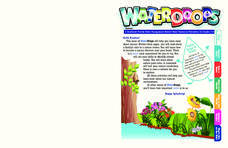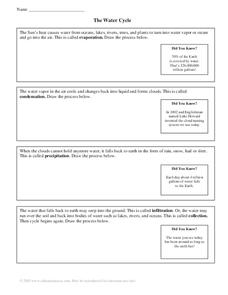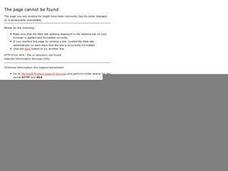Curated OER
The Magic School Bus Dries Up
Students learn along with Ms. Frizzle's class. In this Magic School Bus lesson plan, students work in small groups to find out if foods they eat contain water.
Curated OER
Activity Plan 5-6: Where Does the Water Go?
Students perform an experiment to discover what happens to water as it evaporates. In this early childhood lesson plan, students observe evaporation as they conduct an experiment. Students fill cups with water, then check it daily for...
Curated OER
Mini Water Cycle
In this water cycle learning exercise, students create a mini version of the water cycle in a plastic bag by observing the bag for 5 days. Each day students draw a picture of how their bag looks and write an explanation of what they...
Curated OER
Water Cycle
In this water cycle worksheet, students draw a picture and write a short story. In this fill in the blank and essay worksheet, students complete two activities.
Curated OER
The Water Cycle
For this water cycle worksheet, students learn about the 3 different stages of the water cycle: evaporation, condensation and precipitation. They then solve the 12 problems on the page. The answers are on the last page.
Curated OER
April Showers Bring May Flowers
In this water cycle worksheet, young scholars use a specified internet site to learn about the water cycle. They answer five multiple choice questions about the water cycle.
Curated OER
Waterdrops
In this environment worksheet, students read an article about water drops and the nature center. They pretend that they are going to a nature center and write what they would hope see there. Students also identify living things and...
Curated OER
Waterdrops Growth and Development
In this environment worksheet, students read an article about population growth and development. They describe a few ways that people in their neighborhood could use less water. Students also read a short article about desal and then,...
Curated OER
Waterdrops Water Cycle
In this earth science worksheet, students read an article about the water cycle. Then they continue the story about the travels of a water droplet through time and space. Students also complete sentences by writing in the correct word...
Curated OER
Waterdrops
In this science worksheet, students learn about water cycle, weather, clouds, storms and water resources by completing 8 pages of this full color newsletter. Students read a story, study weather maps, learn to make a rain gauge, learn...
Curated OER
The Water Cycle
In this science worksheet, young scholars learn about the water cycle by reading 4 information paragraphs about evaporation, condensation, precipitation and infiltration/ collection. After each paragraph, students draw a picture of that...
Curated OER
Water in the Air?
In this science worksheet, students collaborate as a group of 4 to conduct a science investigation about the water cycle. Students read about the specific job responsibilities for each team member and record their findings on this sheet.
Curated OER
Hydrologic Cycle
In this science instructional activity, students read about the Hydrologic Cycle. Students use the reading and a diagram to answer 2 comprehension questions.
Curated OER
Plants and the Water Cycle
Students study the role of plants in recycling water by collecting water vapor that is emitted, or transpired, by green plant leaves. They collect and measure the water that transpires through the tiny pores of plant leaves. Afterwards,...
Curated OER
Biosphere II
Students continue their examination of the existence of life on Earth. In groups, they determine the role of the water cycle and other biogeochemical cycles play in keeping balance on Earth. They participate in experiments to discover...
Curated OER
Water Works Wonders
Students examine where water is found in the world, how we use it, and the various forms it takes. They observe the refraction of light through a prism, record the day and night sky over a week's time, and create a topographic model of...
Curated OER
Water Cycle: Mobius Strip
Students describe the water cycle and create a Mobius strip model. They determine that the weathering of rocks continually adds sodium to the Earth's rivers and subsequently to the oceans. They discuss the fact that the water on Earth...
Curated OER
Condensation
Students participate in the scientific process to investigate what happens to water when it evaporates by observing condensation. In small groups they observe what happens to ice in a cup, and what occurs when they hold a bowl of ice...
Curated OER
Changes in Nature
Fifth graders identify the chemical and physical changes in the water cycle, carbon cycle, and the effects of weathering. They analyze the periodic table, and observe how vinegar reacts with limestone in a chemical reaction that causes...
Curated OER
Water Cycle in a Box
Fourth graders investigate how the water cycle is vital for all living things to survive on Earth. They observe the teacher set up a simulation of the water cycle using a Plastic Earth Simulator, desk lamp, and water, and make...
Curated OER
The Water Cycle
Fifth graders investigate evaporation, condensation, and precipitation. They observe a water cycle kit and record their observations, and examine how water condenses on the outside of a cup. Next, they observe an evaporation...
Curated OER
The Water Cycle
Fifth graders identify organisms and processes involved in three cycles: the water cycle, the carbon cycle, and the nitrogen cycle. They produce a pictorial or abstract water cycle, and appropriately place life forms onto an existing...
Curated OER
Water Cycle
Ninth graders explore ways water moves through various reservoirs on Earth, examine how human activities change water cycle, investigate substances present in water that indicate human activity, and discuss how understanding water cycle...
Curated OER
'Round and 'Round it Goes!
Students discuss and interpret background knowledge on poster copy given on the water cycle. Students complete the included activity sheets using the poster as a reference in small groups. Students identify and name where water can be...























